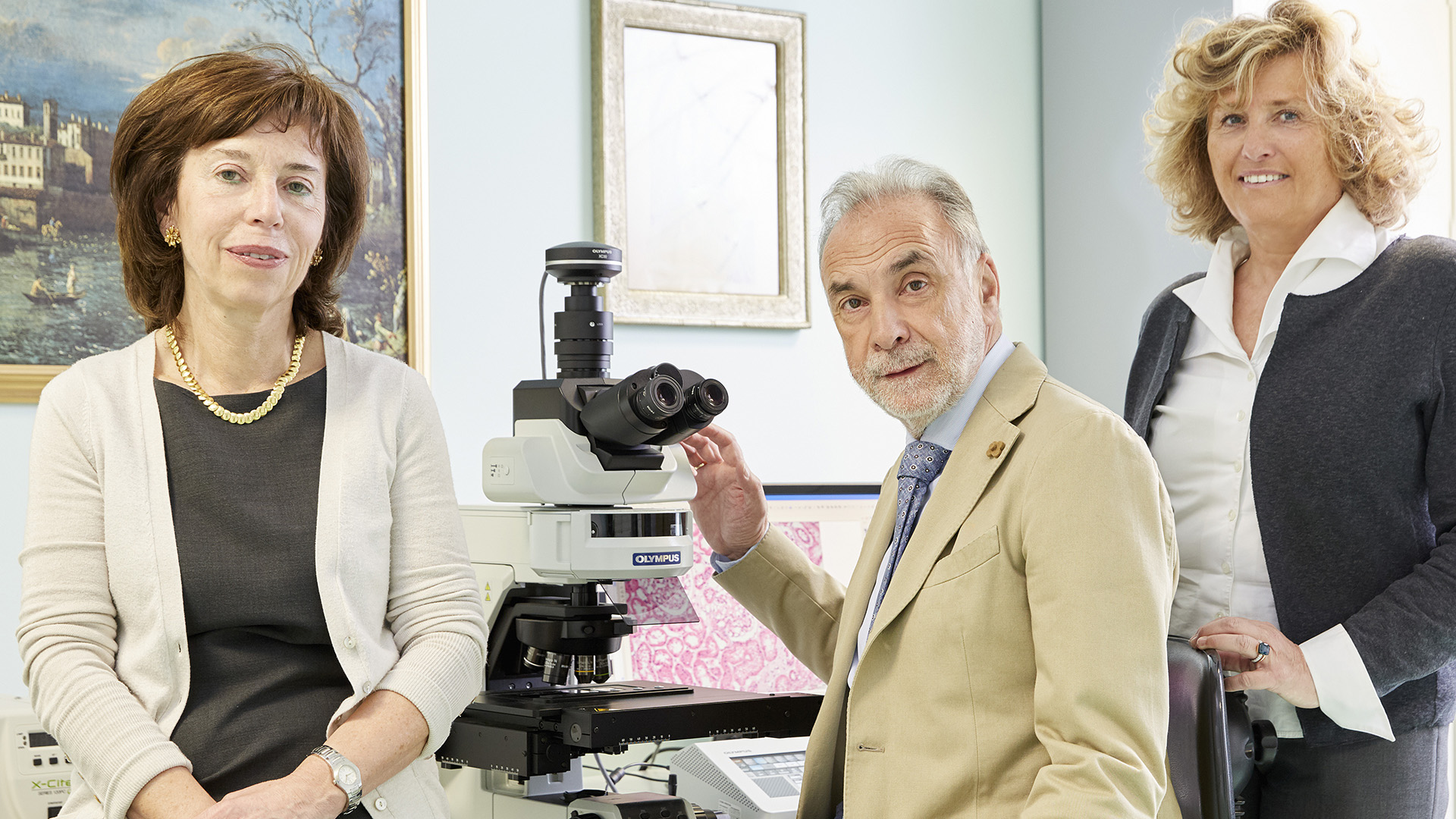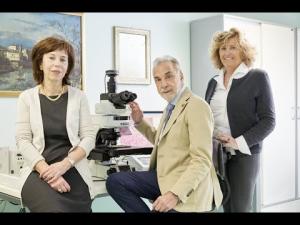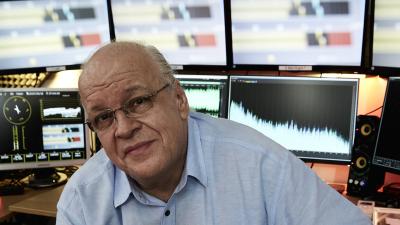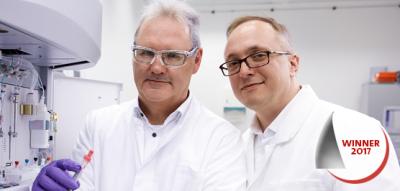Giuseppe Remuzzi, Carlamaria Zoja and Ariela Benigni
ACE inhibitors to stop chronic kidney disease (CKD)
Finalists for the European Inventor Award 2017
Over 200 million people suffer from chronic kidney disease (CKD). Although a simple test can provide early warning - increased protein levels in the urine signal impaired kidney function - many patients only seek help once their symptoms are advanced. At that stage, doctors used to be powerless to stop CKD - or kidney inflammation after organ transplants - from progressing to organ failure and lifelong dependence on dialysis machines.
Dialysis is no longer inevitable, thanks to the medications developed by Remuzzi, Zoja and Benigni. The team achieved its breakthrough after Remuzzi discovered the kidney-saving properties of certain enzyme inhibitors in the late 1980s. Conventionally used to treat hypertension, these inhibitors provided the key mechanism behind the team's patent-protected drugs, which are now standard treatments for CKD worldwide.
Societal benefit
The team's ACE inhibitor-based medications were not only the first drugs to stop the progression of CKD: they also proved effective against diabetic nephropathy, a complication affecting up to 35% of diabetics. One of the team's key drugs, Losartan, specifically benefits organ transplant patients, since CKD affects 21% of intestine and 18% of liver recipients. As a result, patients can recover to lead fully independent lives.
The drugs are powerful tools in developing countries, where dialysis remains widely unavailable and prevention is key. Remuzzi founded an international charity, the Global Advancement Nephrology Project, to bring screening and affordable treatments for kidney complications to impoverished communities.
Remuzzi is also an advocate of preventive testing. "The heart beats, the lung breathes - the kidney does not make any noise, and often people end up being presented with end-stage kidney disease having never realised anything was wrong," he says. A simple urine test can reveal kidney dysfunction, and treatment can then start before the damage becomes irreversible.
Economic benefit
In the 1990s, Remuzzi and his team worked on developing ACE inhibitor-based drugs specifically for kidney disease. Brought to market by pharmaceutical company Merck, in 1995 Losartan received US and EU approval for treating complications from organ transplants, and by 2011 it was generating annual sales of almost EUR 1.5 billion. Another of their drugs, Irbesartan, was approved in 1997 and is marketed by Sanofi. It achieved sales of around EUR 775 million in 2015.
Market analysts BCC Insights valued the US market for kidney-failure treatment at EUR 36 billion in 2016 and expect it to exceed EUR 41.7 billion by 2021. The global market for enzyme inhibitors - including the team's ACE inhibitors - was worth nearly EUR 117 billion in 2016.
As research co-ordinator at the Mario Negri Institute for Pharmacological Research in Bergamo, Remuzzi encourages "his" scientists to pursue research for the sake of science. The Institute was created in Milan in 1963 as a non-profit research institution, and the Bergamo branch was launched to encourage research into rare and "orphan" diseases, which are often neglected as "unprofitable" by pharmaceutical companies. The Institute's policy is not to file patents itself, but to allow other companies to patent its research.
How it works
Doctors identified increased protein output in patients' urine as a warning sign of progressive kidney disease in the 1890s. High protein levels indicate that glomerular filtration rates, which reflect the kidney's ability to filter the blood, are declining.
After ten years of research, Remuzzi made a key discovery: increased protein traffic to the kidney is not just a symptom of kidney disease but a cause, actually increasing damage as it persists.
This discovery led Remuzzi to search for an "off switch" to stop the progression of kidney disease before it could lead to organ failure. He found it in ACE inhibitors. This group of drugs was already known to reduce hypertension, a common complication affecting 70% of lung, heart and liver transplant recipients.
Remuzzi discovered that the mechanism behind ACE inhibitors lowered protein levels in the blood, which halted the progression of kidney disease. He refined the use of ACE compounds into drugs specifically for kidney disease which block angiotensin II type 1 receptors.
The inventors
After earning his medical degree at University of Pavia in 1974, Giuseppe Remuzzi began working with CKD patients and organ-transplant recipients at Bergamo Hospital. After publishing his findings on haemolytic uraemic syndrome (a known cause of CKD) and renal replacement therapy in The Lancet in 1977, he gained international recognition as an authority in his field.
Today, he is professor of nephrology at the University of Milan. He has served as director of the Department of Immunology and Clinical Transplantation (since 1996) and Department of Medicine (since 2011) at Bergamo Hospital. He has been the director of the Division of Nephrology and Dialysis at Azienda Ospedaliera Papa Giovanni XXII in Bergamo since 1999, having become research co-ordinator at the Mario Negri Institute for Pharmacological Research in Bergamo in 1984.
In a research career spanning almost four decades, Remuzzi has authored and co-authored some 1 300 scientific articles. His honours include the ISN Jean Hamburger Award (2005), the John P. Peters Award (2007) and the ISN AMGEN Award (2011).
Carlamaria Zoja and Ariela Benigni both earned their degrees in biological sciences from the University of Milan and PhDs from the University of Maastricht. Zoja has been working as a researcher and scientist at the Mario Negri Institute in Bergamo since 1985, where she currently heads the Laboratory of Pathophysiology of Experimental Renal Disease and Interaction with other Organ Systems in the Department of Molecular Medicine.
Ariela Benigni joined the Mario Negri Institute in Bergamo in 1986 and is currently head of the Department of Molecular Medicine. A renowned expert in the role of blood pressure and proteins in progressive kidney disease, she has authored over 270 peer-reviewed articles and lectured at more than 140 national and international meetings. A recipient of the Citta di Bergamo Merit Award, Benigni has also been consulted by the World Health Organisation as a leading expert on progressive kidney disease.
Did you know?
Conventionally, pharmaceutical research follows a cardinal rule: one drug for one disease. But although ACE inhibitors were originally designed to treat hypertension, Remuzzi discovered that they also had the potential to treat kidney disorders. That made ACE inhibitors part of a select group of drugs which are designed to treat one condition but can be "repurposed" to cure other ailments (often without any significant change in their composition).
Other examples include Tamoxifen (treats breast cancer, but is also effective against bipolar disorders), Gabapentin (developed for epilepsy, now a painkiller), Raloxifene (treats osteoporosis and prevents breast cancer) and even aspirin (a pain killer that prevents heart disease).
Teaching old drugs new tricks offers great advantages: they have already been approved and therefore don't require costly animal testing or clinical trials. "Repurposing" existing medications is a growing trend in research.
Media gallery
Contact
European Inventor Award and Young Inventors Prize queries:
european-inventor@epo.org Subscribe to the European Inventor Award newsletterMedia-related queries:
Contact our Press team#InventorAward #YoungInventors








